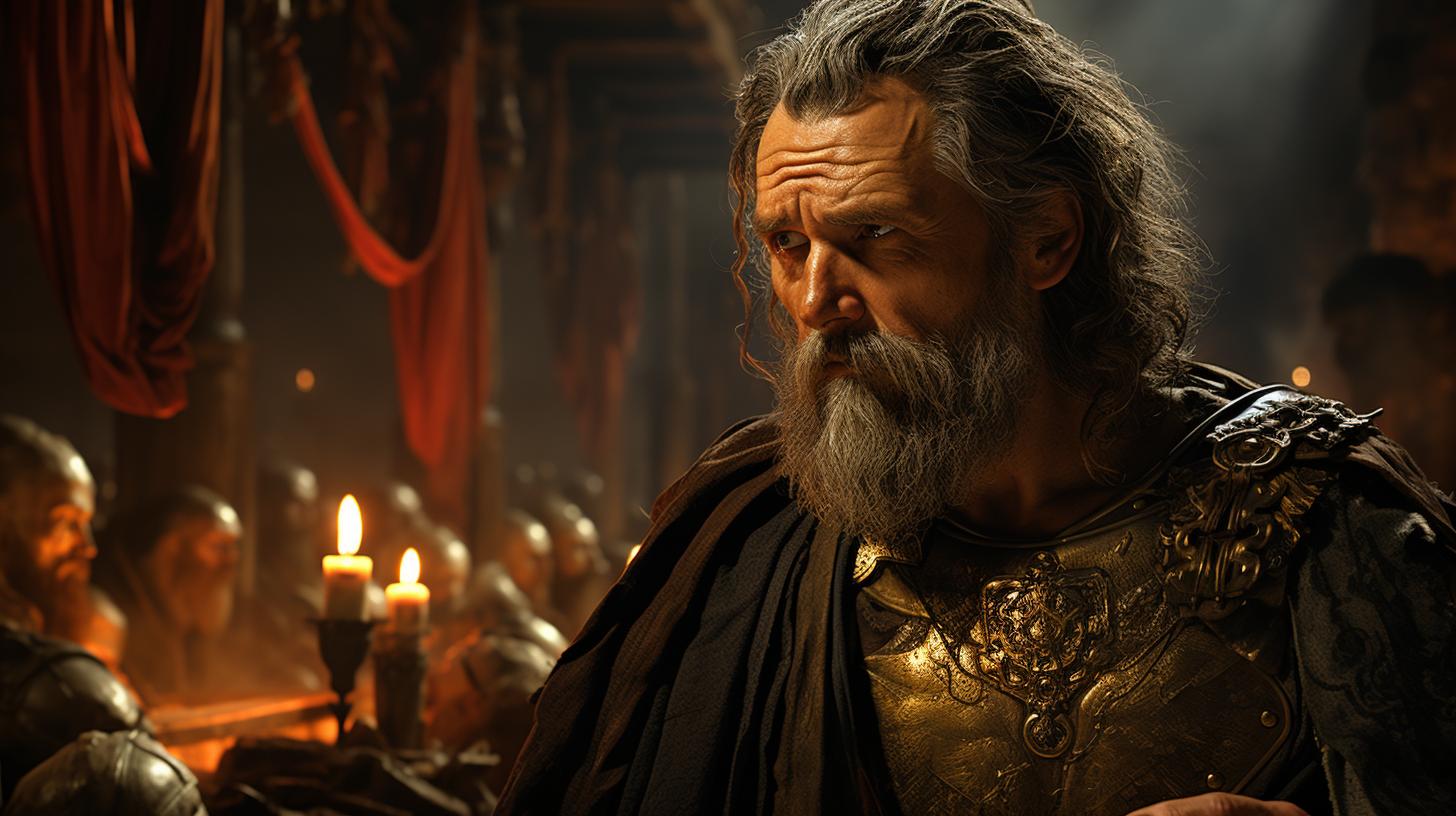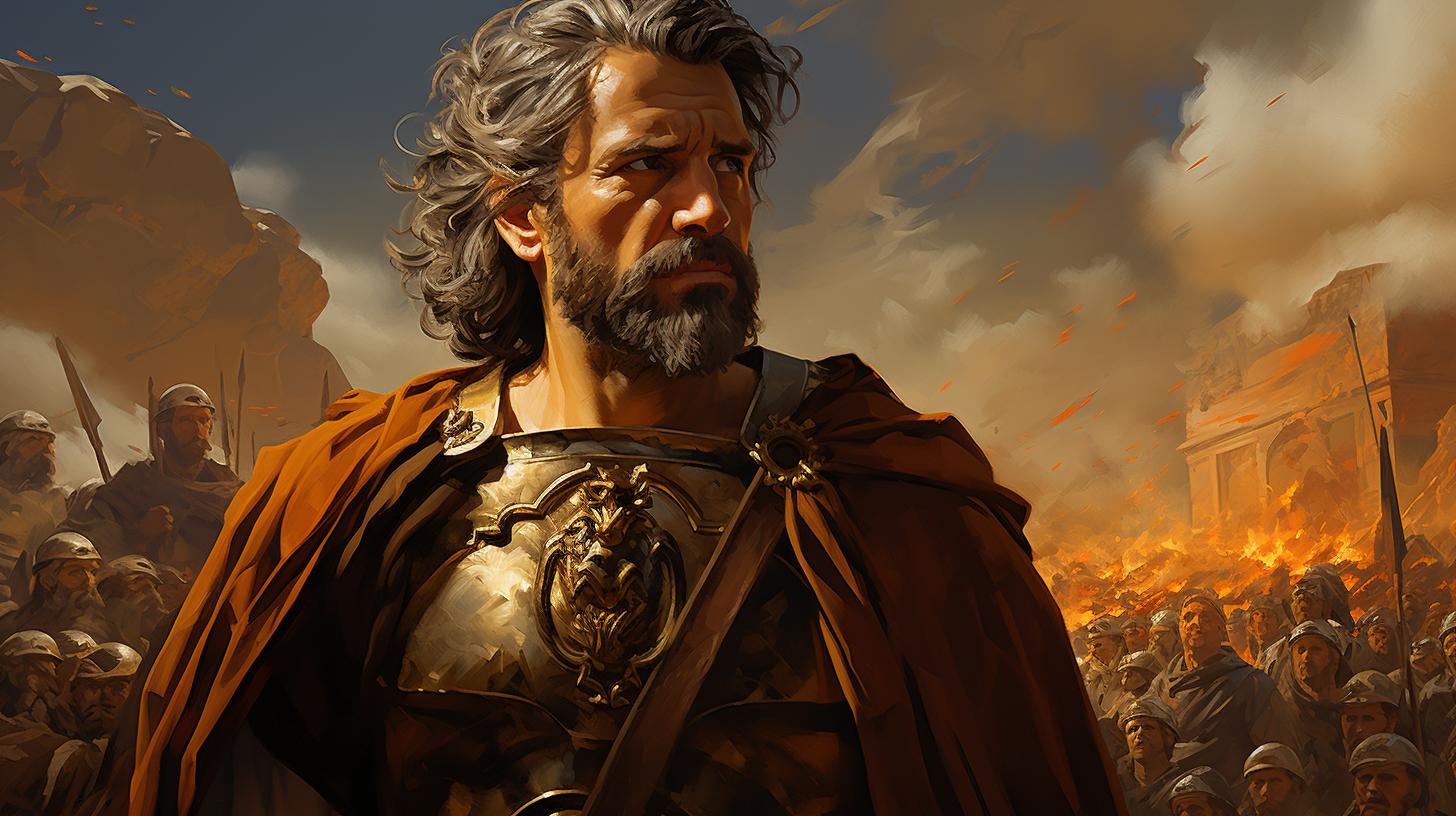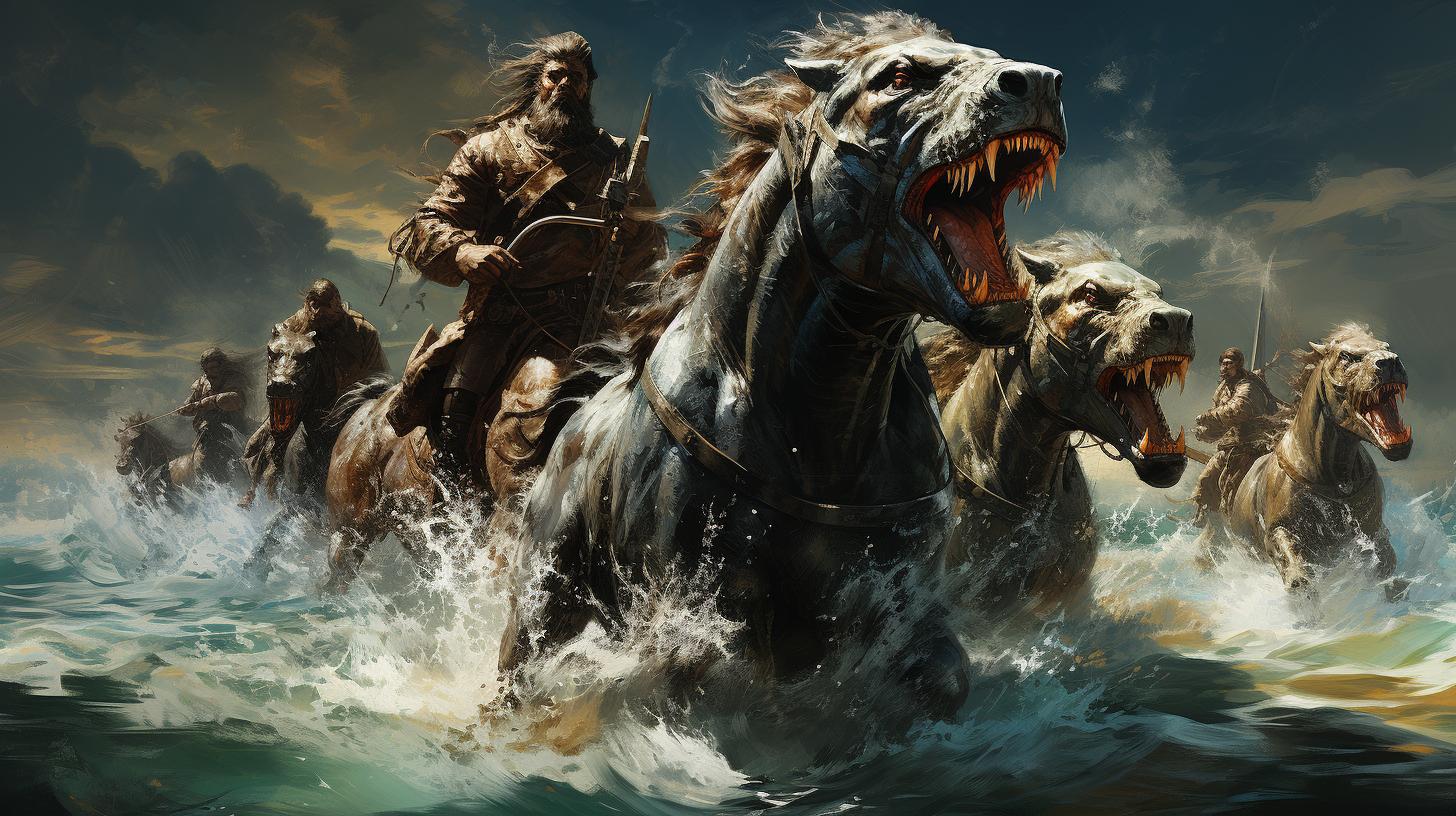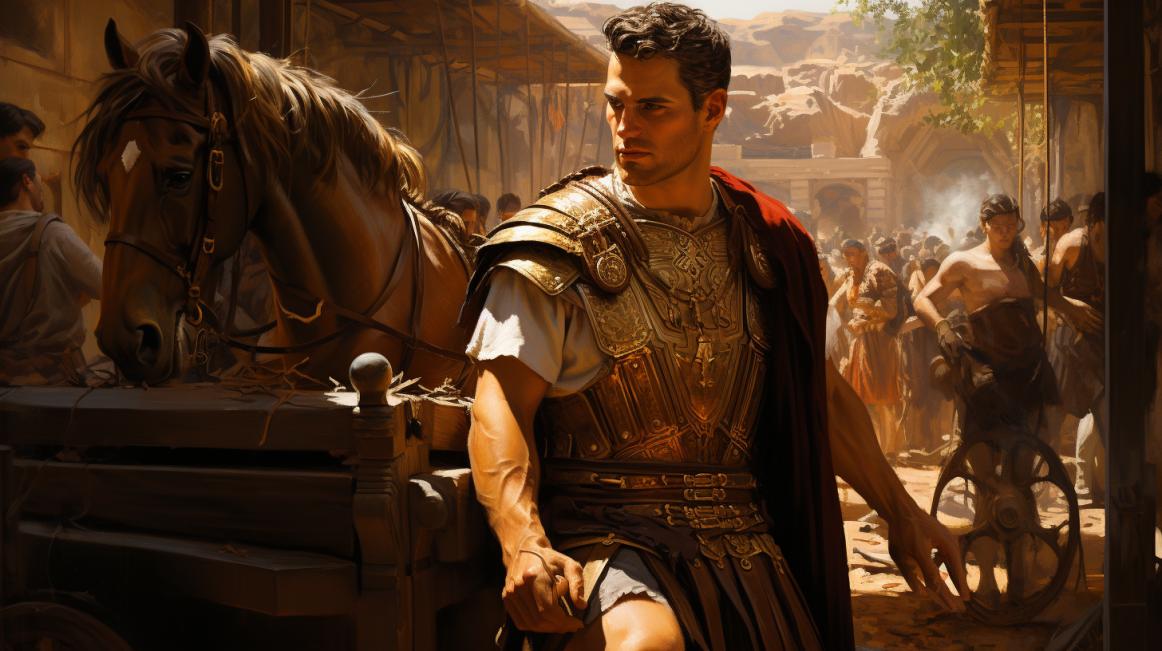Agamemnon Greek Mythology: Unraveling the Legendary Tales

Agamemnon, a prominent figure in Greek mythology, played a significant role in the Trojan War and had complex relationships with notable characters such as Achilles and his brother Menelaus.
His wife Clytemnestra’s revenge led to his tragic demise, but his legacy continues to influence Greek mythology and literature. This article explores various aspects of Agamemnon’s life, including his family lineage, the sacrifices he made, and his interactions with the gods.
From his rule in Mycenae to his artistic representations, delve into the captivating world of Agamemnon’s story.
The Meaning and Pronunciation of Agamemnon
Agamemnon, a prominent figure in Greek mythology, is a name that carries both significance and intrigue. The meaning behind the name ‘Agamemnon’ is rooted in its Greek origins. Derived from the combination of two words, ‘agame’ meaning ‘very much’ and ‘mnemon’ meaning ‘mindful,’ Agamemnon can be interpreted as ‘very mindful’ or ‘extremely intelligent.’
Regarding the pronunciation, it is commonly pronounced as uh-gam-em-non in American English. The emphasis falls on the second syllable, ‘gam.’
As the mythical King of Mycenae and leader of the Greek forces in the Trojan War, Agamemnon’s name resonates with power, intellect, and strategic prowess.
Understanding the meaning and pronunciation behind Agamemnon adds depth to his character and significance within Greek mythology.
Agamemnon’s Family and Lineage
Agamemnon, a legendary figure in Greek mythology, comes from a prominent lineage. He is the son of King Atreus of Mycenae and Queen Aerope. Atreus and Aerope were descendants of Tantalus, a mortal son of Zeus. This ancestry connects Agamemnon to the divine bloodline, emphasizing his noble status.
Agamemnon had a brother named Menelaus, who would later become the husband of Helen, the woman at the center of the Trojan War. Agamemnon was married to Clytemnestra, with whom he had several children, including Iphigenia, Electra, Chrysothemis, and Orestes.
These familial connections play significant roles in Agamemnon’s story.
The House of Atreus, to which Agamemnon belongs, is marred by a cycle of violence and betrayal. This lineage is known for its tragic fate, with each generation suffering from the consequences of past actions.
Agamemnon’s family history sets the stage for the complex dynamics and conflicts that unfold throughout his life.
As the leader of the Greek forces in the Trojan War, Agamemnon’s role is not only tied to his lineage but also impacts his family’s destiny.
The decisions he makes during the war and the repercussions they have on his loved ones demonstrate the intricate relationship between Agamemnon’s actions and his familial ties.
Throughout the mythological narrative, the intricate web of family relationships and the weight of ancestry shape Agamemnon’s character and contribute to the drama and tragedy of his story.
Agamemnon’s Role in the Trojan War
Agamemnon played a crucial role in the epic Trojan War, one of the most famous events in Greek mythology. As the king of Mycenae, he led the Greek forces against the city of Troy, whose prince, Paris, had abducted Helen, the wife of Menelaus, Agamemnon’s brother.
This act of Helen’s abduction triggered the war, and Agamemnon assumed the role of the Greeks’ supreme commander.
Throughout the Trojan War, Agamemnon displayed his military prowess and leadership skills.
He strategized battles, marshaled the Greek troops, and coordinated the efforts of renowned heroes like Achilles, Odysseus, and Ajax. Agamemnon’s presence on the battlefield inspired his soldiers and instilled fear in their Trojan enemies.
However, Agamemnon’s role was not without controversy. He clashed with Achilles, the greatest Greek warrior, over a dispute involving a captured maiden named Briseis. This disagreement led to Achilles’ withdrawal from the war, greatly impacting the Greeks’ military campaign.
Agamemnon’s actions, driven by pride and power, not only strained his relationship with Achilles but also affected the progress of the war.
Despite the challenges, Agamemnon displayed strategic acumen in devising tactics to breach the seemingly impenetrable walls of Troy.
He played a pivotal role in the famous ruse of the Trojan Horse, a wooden horse filled with Greek soldiers that infiltrated the city, eventually leading to its downfall.
Agamemnon’s role in the Trojan War showcased his leadership qualities, military expertise, and determination to avenge the abduction of Helen. His actions and decisions shaped the outcome of the war, leaving a lasting impact on Greek mythology and the cultural legacy associated with the story of the Trojan War.
Agamemnon’s Relationship with Achilles
Agamemnon’s relationship with Achilles, the great warrior of Greek mythology, was fraught with conflict and resentment. As the commander-in-chief of the Greek forces in the Trojan War, Agamemnon’s actions deeply affected Achilles and ultimately led to a bitter feud between the two.
One pivotal event that strained their relationship was Agamemnon’s appropriation of Achilles’ prized concubine, Briseis, as a way to restore his own honor after returning Chryseis, a captive priestess, to her father.
This act of disrespect sparked Achilles’ anger and led him to withdraw from the war, causing significant setbacks for the Greek army.
Their animosity continued to escalate when Agamemnon refused to apologize or make amends for his actions.
Achilles’ absence from the battlefield further propelled their conflict, as Agamemnon was faced with the consequences of his disrespect towards the greatest warrior of his army.
It wasn’t until the death of Achilles’ companion, Patroclus, at the hands of Hector, the Trojan prince, that Agamemnon recognized the gravity of his actions.
Driven by guilt and remorse, he offered numerous gifts and apologies to Achilles, hoping to reconcile and regain his support. Eventually, their differences were set aside, and both warriors fought alongside each other to avenge Patroclus and claim victory over the Trojans.
Agamemnon’s relationship with Achilles serves as a cautionary tale of the consequences that arise from disrespect and pride. It highlights the complexities of leadership and the importance of maintaining strong bonds within an army, emphasizing the need for mutual respect and understanding.
Agamemnon’s Rivalry with Menelaus
Agamemnon, the renowned warrior and king of Mycenae, had a complex relationship with his brother Menelaus. Their rivalry was deeply rooted and played a significant role in the events of Greek mythology.
As the sons of Atreus, Agamemnon and Menelaus were both of noble birth and sought power and prestige. However, their ambitions often clashed, creating tension between them. One of the key catalysts for their rivalry was their shared desire for Helen of Sparta, who eventually became the infamous cause of the Trojan War.
When Helen was abducted by Paris of Troy, Menelaus called upon Agamemnon and other Greek kings to help him retrieve his wife. This united effort against Troy would become known as the Trojan War.
As the commander-in-chief of the Greek forces, Agamemnon’s authority was constantly challenged by Menelaus, who saw himself as the rightful leader due to his personal stake in the conflict.
Throughout the Trojan War, Agamemnon and Menelaus found themselves at odds on numerous occasions.
Agamemnon’s decisions as the leader often clashed with Menelaus’ interests, leading to further animosity between the brothers. Despite their differences, they managed to put aside their rivalry for the sake of the Greek army’s victory.
It is important to note that Agamemnon’s relationship with Menelaus was not solely defined by rivalry. They were brothers, and despite their conflicts, they shared a familial bond. Both Agamemnon and Menelaus held important roles in Greek mythology and played integral parts in the epic tales of the Trojan War and its aftermath.
Agamemnon’s Wife and Children
Agamemnon, the legendary figure from Greek mythology, had a complex family life. His wife was Clytemnestra, the daughter of a Spartan king. Together, they had several children, including Iphigenia, Electra, Orestes, and Chrysothemis.
One of the most tragic events involving Agamemnon’s family was the sacrifice of his daughter, Iphigenia. In order to appease the gods and ensure a successful voyage to Troy, Agamemnon agreed to sacrifice his daughter.
This decision left a lasting impact on Agamemnon and his relationship with Clytemnestra.
After Agamemnon’s return from the Trojan War, he faced the wrath of his wife. Clytemnestra, deeply resentful of the sacrifice of their daughter, conspired with her lover, Aegisthus, to avenge Iphigenia’s death.
In a chilling act of betrayal, Clytemnestra murdered Agamemnon as he arrived home, seeking revenge for the loss of their daughter and her own suffering during his absence.
Agamemnon’s children, Electra and Orestes, later played significant roles in seeking justice for their father’s murder.
Orestes, driven by the Furies and urged by Apollo, avenged Agamemnon by killing both Clytemnestra and Aegisthus, thus restoring familial honor.
The story of Agamemnon’s wife and children showcases the intricate web of relationships and consequences that existed within Greek mythology.
It highlights the devastating effects of sacrifice, betrayal, and vengeance on the lives of those involved.
The Sacrifice of Agamemnon’s Daughter, Iphigenia
One of the most tragic and controversial episodes in the life of Agamemnon is the sacrifice of his daughter, Iphigenia. This event took place before the start of the Trojan War and had a profound impact on Agamemnon and his family.
The sacrifice was demanded by the goddess Artemis, who was angered by Agamemnon’s actions. In some versions of the myth, Agamemnon had offended Artemis by boasting about his hunting skills and claiming to be a better hunter than her.
As a result, Artemis punished him by creating unfavorable winds that prevented the Greek fleet from sailing to Troy. To appease the goddess and ensure a safe journey, Agamemnon was instructed to sacrifice his daughter.
Agamemnon faced an agonizing decision. On one hand, he wanted to fulfill his duty as a leader and ensure the success of the war effort. On the other hand, he loved his daughter and could not bear the thought of sacrificing her.
Ultimately, pressured by both his own desire for power and the pressures of war, Agamemnon made the fateful decision to sacrifice Iphigenia.
This act of sacrifice had far-reaching consequences, both for Agamemnon and his family.
It shattered his relationship with his wife Clytemnestra, who never forgave him for the loss of their daughter. Clytemnestra’s resentment and anger would later fuel her thirst for revenge against Agamemnon.
The sacrifice of Iphigenia serves as a powerful reminder of the moral dilemmas faced by the characters in Greek mythology. It explores the themes of duty, sacrifice, and the consequences of one’s actions.
The story of Agamemnon and his daughter is a tragic tale that highlights the complexities of human nature and the impact of decisions made in times of crisis.
As we delve deeper into the world of Agamemnon and his role in Greek mythology, it is important to understand the sacrifices made and the profound effect they had on his life and those around him.
The sacrifice of Iphigenia is a pivotal moment in Agamemnon’s story, shaping his character and contributing to the dramatic events that unfold.
Clytemnestra’s Revenge: The Murder of Agamemnon
The story of Agamemnon concludes with a chilling act of vengeance orchestrated by his own wife, Clytemnestra. Motivated by years of resentment, Clytemnestra plots to avenge the sacrifice of their daughter, Iphigenia, and Agamemnon’s infidelity during the Trojan War.
Upon Agamemnon’s return to Mycenae, Clytemnestra welcomes him with apparent joy and celebration. However, her true intentions remain hidden until that fateful moment when she reveals her treacherous plot. With the help of her lover, Aegisthus, Clytemnestra lures Agamemnon into a bath, where she traps and kills him.
This act of betrayal and murder establishes Clytemnestra as a complex and formidable character in Greek mythology. Her actions raise moral questions about the boundaries of justice and revenge. Did Agamemnon deserve to die for his transgressions, or did Clytemnestra go too far in seeking retribution?
The murder of Agamemnon sets into motion a series of tragic events that continue to reverberate throughout Greek mythology.
The consequences of his death ultimately lead to the avenging of his murder by his son Orestes, as foretold by the oracle of Delphi.
This dramatic and vengeful chapter in the life of Agamemnon showcases the complex and often tumultuous relationships between characters in Greek mythology.
Clytemnestra’s revenge serves as a cautionary tale, reminding us of the destructive power of betrayal and the enduring consequences of our actions.
The Aftermath: Orestes and the Avenging of Agamemnon
After Agamemnon’s brutal murder at the hands of his wife Clytemnestra and her lover Aegisthus, his son Orestes takes center stage in the story. Driven by a strong desire for vengeance, Orestes seeks to avenge his father’s death and restore justice to the house of Atreus.
Orestes’ journey of retribution starts with the guidance of the god Apollo, who instructs him to kill his mother and her accomplice.
Filled with conflicting emotions and torn between familial duty and the weight of his actions, Orestes carries out the bloody deed.
The act of matricide sets off a chain of events, as the Furies, goddesses of vengeance, relentlessly pursue Orestes for the violation of blood ties.
Tormented by guilt and haunted by the Furies, Orestes becomes an outcast, wandering from land to land in desperation.
In his pursuit of redemption, Orestes finds himself standing trial before the gods on the Areopagus Hill in Athens.
Here, the goddess Athena presides over the trial and casts the deciding vote, ultimately acquitting Orestes and freeing him from the Furies’ torment.
- Orestes’ journey of vengeance and the moral complexities it entails
- The conflicting emotions and internal struggle of Orestes
- The role of divine intervention in Orestes’ journey
- The pursuit of justice and the concept of blood guilt
- Orestes’ trial and the role of Athena in his acquittal
The dramatic aftermath of Agamemnon’s murder is a testament to the lingering consequences of familial betrayal and the complex nature of seeking justice.
Orestes’ story sheds light on the blurred lines between right and wrong and the intricate workings of divine intervention in Greek mythology.
Agamemnon’s Influence on Greek Mythology and Literature
Agamemnon, the legendary figure from Greek mythology, has had a profound impact on the narratives and literary traditions of ancient Greece. His story has been a source of inspiration for countless writers and artists throughout history.
One of the major ways in which Agamemnon’s influence can be seen is through his pivotal role in the Trojan War. As the leader of the Greek forces, his actions and decisions shaped the outcome of the war, making him a central character in the epic tales of the conflict.
Agamemnon’s triumphs and failures in the war have become timeless themes in Greek literature, exploring concepts of heroism, leadership, and the consequences of hubris.
In addition to his role in the Trojan War, Agamemnon’s complex relationships with other notable characters have also contributed to his lasting influence.
His rivalry with Menelaus, his brother and husband of Helen, sparked the war itself. Agamemnon’s interactions with Achilles, particularly their conflict over honor and pride, have been depicted in various poems and plays, showcasing their contrasting personalities and moral dilemmas.
The sacrifice of Agamemnon’s daughter, Iphigenia, has also had a significant impact on both mythology and literature. This tragic event, carried out to appease the gods and ensure safe passage to Troy, has been the subject of numerous retellings, symbolizing the sacrifices made in the name of war and the struggles of fatherhood.
Clytemnestra’s revenge, the murder of Agamemnon upon his return from the war, adds another layer to his legacy. This act of betrayal and the subsequent repercussions, such as the avenging actions of Agamemnon’s son, Orestes, have provided rich material for playwrights and poets, delving into themes of justice, retribution, and the complexities of familial relationships.
Agamemnon’s influence extends beyond the realm of literature as well. His reign in Mycenae and his connections with the gods have inspired architectural designs and artistic representations. His story has been depicted in sculptures, pottery, and frescoes, allowing visual interpretations of his character and the events surrounding him.
Overall, Agamemnon’s influence on Greek mythology and literature resides in his role as a multifaceted and flawed protagonist. His actions, relationships, and sacrifices have sparked debates, interpretations, and reimaginations throughout the ages.
As his story continues to be retold, Agamemnon remains an enduring figure, capturing the imagination and curiosity of audiences seeking to understand the complexities of human nature and the consequences of power.
Comparing Agamemnon in Homer’s Iliad and Odyssey
Agamemnon is a central character in both Homer’s epic poems, the Iliad and the Odyssey. While his portrayal in these works may differ, they provide valuable insights into his character and role.
In the Iliad, Agamemnon appears as the commander-in-chief of the Greek forces during the Trojan War. He is depicted as a powerful and ambitious leader, but also as someone plagued by personal flaws.
Agamemnon’s arrogance and his mistreatment of Achilles lead to significant conflicts within the Greek camp, ultimately impacting the course of the war. Homer portrays Agamemnon’s actions as catalysts for tragedy and discord among the Greek heroes.
On the other hand, the Odyssey presents a more nuanced view of Agamemnon. In this epic, Agamemnon serves as a cautionary tale for the protagonist, Odysseus. Through the character of Agamemnon, Homer explores themes of betrayal, vengeance, and the consequences of one’s actions.
Agamemnon’s fate at the hands of his wife, Clytemnestra, serves as a stark reminder of the dangers that await those who fail to uphold their oaths and responsibilities.
While the Iliad focuses on the grandeur of the Trojan War and the heroics of the Greek warriors, the Odyssey delves into the complexities of human nature and the consequences of hubris.
In both poems, Agamemnon plays a significant role in shaping the narrative and conveying important moral and ethical lessons.
Overall, comparing Agamemnon’s portrayal in the Iliad and the Odyssey highlights the multifaceted nature of his character and showcases the depth of Homer’s storytelling.
Through these ancient epics, we gain a deeper understanding of Agamemnon’s actions, motivations, and the lasting impact of his choices.
Mycenae and Agamemnon’s Rule
Mycenae, located in the northeastern part of the Peloponnese in Greece, was the legendary city associated with Agamemnon’s rule. As the son of King Atreus and Queen Aerope, Agamemnon inherited the throne of Mycenae and became a powerful leader in the region.
His reign was marked by both prosperity and turmoil, shaping the history and mythology of Mycenae.
Under Agamemnon’s rule, Mycenae flourished as a center of wealth, culture, and military might. The city was fortified with massive walls made of Cyclopean stones, showcasing the impressive architectural skills of the Mycenaeans.
The Lion Gate, adorned with mythical lions, served as the main entrance to the citadel.
Agamemnon’s leadership extended beyond his own kingdom. He played a crucial role in assembling the Greek forces for the Trojan War, rallying warriors from various Greek city-states to fight against Troy.
As the commander-in-chief of the Greek army, Agamemnon’s authority and strategic brilliance guided the Greeks in their ten-year siege of Troy. However, his decisions and actions during the war would have far-reaching consequences.
In addition to his military prowess, Agamemnon was known for his wealth and opulence. Mycenae became a center of trade and prosperity, with treasures from conquered lands flowing into the city.
The famous Treasury of Atreus, a tomb believed to be associated with Agamemnon’s lineage, stands as a testament to the city’s prosperity and artistic achievements.
Despite his successes, Agamemnon’s rule was not without challenges.
Mythological accounts depict a strained relationship with his wife, Clytemnestra, and a bitter rivalry with his brother, Menelaus. These conflicts and personal struggles would ultimately lead to his tragic demise at the hands of Clytemnestra.
The rule of Agamemnon in Mycenae left an indelible mark on Greek mythology. His leadership, military prowess, and complicated relationships shaped the narrative of the time. Even in the aftermath of his death, the legacy of Agamemnon in Mycenae continued to influence future generations and the course of Greek history.
Agamemnon’s Art and Cultural Representations
Throughout history, Agamemnon’s character and story have been a prominent subject in various forms of art and cultural expressions. Artists, writers, and playwrights have been inspired by the captivating narrative of Agamemnon’s life, his role in the Trojan War, and the tragic events surrounding his family.
1. Visual Art:
- Paintings and sculptures depicting Agamemnon can be found in museums and art galleries worldwide. Artists have portrayed him in various ways, capturing his regal presence, leadership, and the complexities of his personality.
- One well-known example is the iconic Mask of Agamemnon, a gold funeral mask discovered by Heinrich Schliemann in 1876 at the site of Mycenae.
This mask, believed to be from the late Bronze Age, has become synonymous with Agamemnon and his legendary status.
2. Theater and Literature:
- Agamemnon’s story has been a popular theme in ancient Greek plays, particularly in the works of Aeschylus, Euripides, and Sophocles.
Their tragedies, such as Aeschylus’ “Oresteia” trilogy, dive deep into the themes of justice, revenge, and the consequences of actions.
- Modern literature also draws inspiration from Agamemnon’s tale. Many authors have reimagined or referenced his character in their works, exploring his complexities and the impact of his actions.
3.
Music and Dance:
- Composers and musicians have drawn inspiration from Agamemnon’s story, creating pieces that reflect the emotional intensity and grandeur associated with his character. Operas, ballets, and symphonies centered around his tragic arc have been performed worldwide.
4.
Film and Television:
- Agamemnon and the events surrounding his family have been adapted into films and television series, bringing the ancient myth into the modern era. These adaptations provide new interpretations and visual representations of his character, engaging audiences with his compelling story.
Agamemnon’s art and cultural representations serve as a testament to the enduring impact his character and mythos have had on human creativity and storytelling.
Through various artistic mediums, his legacy continues to capture our imagination and offer insights into the complexities of humanity.
Agamemnon and the Gods: Divine Interactions
In Greek mythology, Agamemnon’s story is closely intertwined with the interactions he had with the gods. These divine beings played a crucial role in shaping his fate and the events surrounding him.
One notable divine interaction is Agamemnon’s encounter with the god Apollo. In some versions of the myth, Agamemnon offends Apollo by refusing to return his priest Chryses’ daughter, Chryseis, who was taken as a war prize.
As a result, Apollo sends a plague upon the Greek camp, causing widespread death and suffering. In order to appease Apollo, Agamemnon is forced to return Chryseis and offer sacrifices to the god.
Another significant divine interaction involves the goddess Athena. She is said to have played a vital role in the success of the Greek army during the Trojan War. Athena appears to Agamemnon and inspires him with strategic advice, guiding him in battle.
Her presence and assistance contribute to the Greek victory in many key battles.
Agamemnon’s relationship with the god Zeus is also significant. As the king of the gods, Zeus is often portrayed as a figure who influences and directs the actions of mortals.
In some versions of the myth, Zeus supports Agamemnon’s rule and aids him in his endeavors. However, in other versions, Zeus tests Agamemnon’s leadership and character, often creating challenges and obstacles that Agamemnon must overcome.
Besides these major interactions, Agamemnon’s story is peppered with encounters with various other gods, including Hermes, Hera, Poseidon, and Artemis, to name just a few. These interactions often serve to emphasize Agamemnon’s position as a significant figure in the world of mythology and highlight the power and influence of the gods in shaping mortal destinies.
Overall, Agamemnon’s divine interactions play a central role in his story, influencing his decisions and determining his fate. These encounters with the gods underline the complex relationship between mortals and immortals in Greek mythology, showcasing the gods’ intervention in mortal affairs and their impact on the lives of legendary figures like Agamemnon.
Key Themes and Lessons from the Story of Agamemnon
Agamemnon’s story is rich in themes and lessons that continue to resonate in Greek mythology and beyond. Here are some key takeaways:
- Betrayal: The story of Agamemnon highlights the consequences of betrayal, particularly through the actions of his wife Clytemnestra.
It serves as a cautionary tale about the dangers of deceit and the potential for vengeance.
- Hubris: Agamemnon’s tragic fate demonstrates the destructive nature of hubris, or excessive pride. His arrogance, especially in sacrificing his daughter Iphigenia, incurs the wrath of the gods and ultimately leads to his downfall.
- Family Dynamics: The complex relationships within Agamemnon’s family, including his strained relationship with his brother Menelaus and the turmoil caused by Clytemnestra’s revenge, explore the intricacies of familial bonds and the consequences of familial discord.
- Sacrifice: The sacrifice of Iphigenia by Agamemnon raises ethical questions about the limits of loyalty and the tragic consequences of extreme choices.
It emphasizes the weight of decisions made for the sake of personal gain or societal expectations.
- Divine Justice: Agamemnon’s story reflects the belief in divine justice and the concept of retribution.
The gods play a significant role in his life, punishing him for his actions and ensuring that justice is served.
- Leadership and Responsibility: Agamemnon’s role as a leader during the Trojan War showcases the challenges and responsibilities that come with leadership positions.
His decisions and actions have far-reaching consequences and highlight the importance of wise and just leadership.
- Tragedy and Fate: Agamemnon’s story exemplifies the tragic nature of Greek mythology, where individuals are often subject to the whims of fate and face devastating consequences.
It underscores the notion that even the mightiest heroes are not immune to their destined outcomes.
The themes and lessons from Agamemnon’s story continue to inspire and provoke contemplation, inviting us to reflect on our own values, choices, and the consequences they may entail.
The Legacy of Agamemnon in Greek Mythology
Agamemnon, the legendary figure of Greek mythology, has left a profound and enduring legacy in the world of ancient stories. His tale, filled with triumphs, tragedies, and complex family dynamics, continues to captivate audiences and has shaped the landscape of Greek literature and culture.
Here are some key aspects of Agamemnon’s legacy:
- Inspiration for Greek Tragedies: Agamemnon’s story serves as a rich source of inspiration for Greek playwrights, particularly in the genre of tragedy.
His tumultuous relationships, the sacrifice of his daughter Iphigenia, and his eventual murder by his vengeful wife Clytemnestra, have served as dramatic material for renowned playwrights like Aeschylus and Euripides.
- Epic Poetry: Agamemnon’s character plays a significant role in two of Homer’s epic poems, the Iliad and the Odyssey.
His actions and interactions with other mythological figures, such as Achilles and Menelaus, showcase his complexity as a leader and warrior.
- Moral and Ethical Lessons: Agamemnon’s story explores themes of power, pride, and the consequences of one’s actions.
His downfall serves as a cautionary tale, reminding audiences of the dangers of hubris and the importance of balance in leadership.
- Historical Significance: While the stories of Greek mythology are steeped in legend, scholars believe that figures like Agamemnon might have had a historical basis.
The Mycenaean civilization, with Mycenae as its prominent city, correlates with Agamemnon’s reign and provides archaeological evidence of ancient Greek civilization.
- Cultural Influence: Agamemnon’s name and story continue to resonate in contemporary culture.
His character has inspired numerous adaptations in literature, theater, film, and television, ensuring that his mythological presence remains alive and continues to captivate new generations.
The legacy of Agamemnon in Greek mythology extends far beyond his personal story.
His character and the themes surrounding his life have permeated the ancient world and continue to shape our understanding of Greek literature and culture to this day.




















